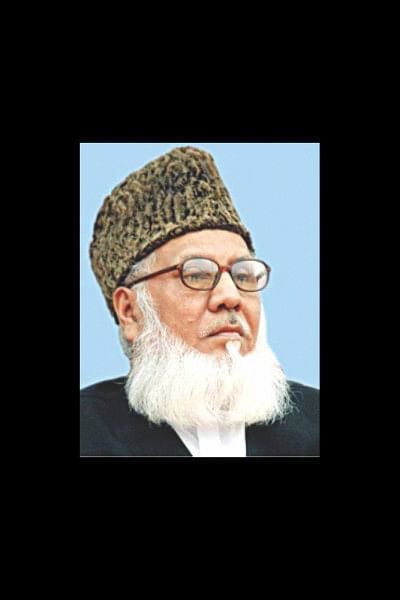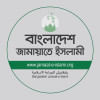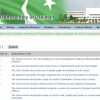Nizami’s profile

War criminal Motiur Rahman Nizami's appointment as a minister by the BNP-led government was a slap in the face to our Liberation War, as well as to the martyrs and the women who were violated and brutally murdered during the war.
The International Crimes Tribunal-1 had this observation while delivering its verdict on Nizami on November 29, 2014.
“This shameful act [appointing Nizami as a minister] was disgraceful for the nation as a whole,” said Justice M Enayetur Rahim who headed the tribunal.
Hailing from an ordinary family of Pabna, Nizami worked his way to the top of Jamaat-e-Islami, the party which avowedly opposed Bangladesh's independence in 1971. Ironically enough, 30 years later this very denouncer of Bangladesh's birth won a cabinet berth and rode in a car hoisting the country’s red-green flag earned at the cost of three million lives. He was first agriculture minister and then industries minister during the BNP-led four-party alliance rule in 2001-2006.
While many war crimes convicts and accused were infamous for their brutality, Nizami’s uniqueness lay in his pro-Pakistan speeches which had his followers immensely enthused. Many war crimes documents show how Nizami exhorted his followers through his flamboyant, anti-Bangladesh speeches and articles in newspapers.
Born on March 31, 1943, in a village of Santhia in Pabna, he enrolled in Boalmari Madrasa at Santhia and passed the Fazil examination in 1961 from there. He received his Kamil degree in Fiqah in 1963 from Madrasa-e-Alia in Dhaka where he began student politics. He completed his graduation as a private student in 1967 from Dhaka University, according to war crimes case documents.
The president of Islami Chhatra Sangha (ICS), the then Jamaat-e-Islami's student wing, Nizami led the Al-Badr force which had killed the leading pro-independence writers and intellectuals just before the war ended. Documents show that most Al-Badr men were recruited from Chhatra Sangha.
Nizami assisted war crimes convict Ghulam Azam, the then chief of Jamaat's East Pakistan wing, in forming the Shanti Committee, Razakars, Al-Badr, Al-Shams. After Azam quit his party post in 2000, Nizami was elected the Jamaat Ameer, documents show.
A cursory glance at the records of his activities during the nine-month war brings out his active collaboration with Pakistani occupation forces. At times he was seen in rallies and meetings with Ghulam Azam while at other times he was seen visiting the Mohammadpur Physical Training Institute where Jamaat and its auxiliary forces tortured Hindus and freedom fighters. Neither was he a stranger in Pabna, or Chittagong, or Jessore where he would be seen addressing anti-liberation rallies.
According to evidence collected from intelligence reports in 1971, Nizami addressed a Chhatra Sangha meeting in Jamalpur as the chief guest on June 14, 1971, and directed his activists to assist the Pakistani army to “save Islam and Pakistan”.
On April 12, the Nizami-led Chhatra Sangha and Jamaat brought out a procession chanting "Long live Pakistan".
"If the patriotic people had come forward since March 1 to confront the miscreants, the situation would not have come to this. Allah has given the faithful Muslims the duty to protect His beloved Pakistan, but when the Muslims failed, Allah protected Pakistan through the military," Nizami said while addressing a seminar at the Muslim Institute in Chittagong on August 2. The seminar was organised by the Chittagong unit Chhatra Sangha.
"We forgot our identity after achieving Pakistan. When India attacked our country in 1965, we became self-aware but we were confused as soon as the war ended. Allah punished us. Now we have become self-conscious again but if we make the same mistake again, maybe Allah will not give us another chance," he further said at the seminar.
"Those who want to secede from Pakistan want to uproot Islam from this country," Nizami was quoted by a Sangram report as saying on August 16.
The documents submitted by the prosecution have brought to light many more interesting facts.
While visiting an Al-Badr camp on September 22, Nizami said, "Only the patriotic youths of East Pakistan can effectively annihilate the Indian infiltrators and their local agents."
Celebrating the Badr day on November 14, 1971, Nizami wrote an editorial in Sangram, saying, "Hindu forces are far stronger and more capable than us. Unfortunately, a number of infidels have taken their side and are trying to weaken us from within. We have to foil their conspiracy and protect the existence and ideals of Pakistan. This is not possible only by defensive action ... It is our luck that the Islam-loving youths of this country have been able to form the Al-Badr with the help of the Pakistani military ... The youths of Al-Badr have renewed their pledge on this occasion ... to stand by the army to defeat the Hindu forces and annihilate Hindustan and hoist the flag of Islam all over the world."
Nizami’s son Nazib Momen, who was the fourth defence witness in the war crimes case, justified the cause of his father’s love for Pakistan with the view that “Nizami is a believer in the movement for creating an Islamic state”.
The war crimes convict went into hiding soon after the Pakistan army’s surrender and lay low until 1975.
He became active in politics again during Gen Ziaur Rahman’s regime in 1979 and was ameer of Jamaat's Dhaka city unit and member of its central executive committee from 1978-1982.
Nizami was also assistant secretary general of Jamaat-e-Islami from 1983 to 1988 and became its secretary general in December 1988. He remained in the post till 2000.
He became the ameer of Jamaat-e-Islami in 2000, the highest party position which he still holds.
Nizami was elected a member of parliament in 1991 and was the leader of Jamaat's parliamentary party from 1991 till 28 December 1994. After he was elected a member of parliament again in 2001, he was the agriculture minister from 2001-2003 and the industries minister from 2003-2006. End...

 For all latest news, follow The Daily Star's Google News channel.
For all latest news, follow The Daily Star's Google News channel. 








Comments